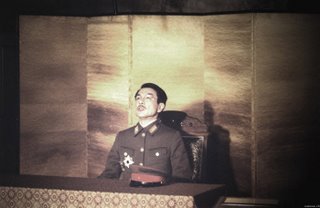 The idea of a political double bill isn't bad, especially if you throw in the additional shared themes of bodily decrepitude and power (i.e. politics by another name). These two films, now available on DVD, are both superb examinations of "great" men in decline - one, the Japanese Emperor Hirohito, a shy, eccentric man with a terrible facial tic, who would rather study cetaceans in a lab than negotiate surrender to the Allies - the other, the carnivorous leftist French leader whose shady past in Vichy during WW2 interrupts his dying days as caught by his official biographer. In each film, the study of character is exquisite - one becomes Hirohito in an extraordinary act of cinematic phenomenology - and Mitterand, though always the other, is so exuberantly portrayed he is larger than most actual lives - his literary interventions and monologues on food and women, make him a kind of French Orson Welles. I highly recommend both films, two of the finest of the last few years.
The idea of a political double bill isn't bad, especially if you throw in the additional shared themes of bodily decrepitude and power (i.e. politics by another name). These two films, now available on DVD, are both superb examinations of "great" men in decline - one, the Japanese Emperor Hirohito, a shy, eccentric man with a terrible facial tic, who would rather study cetaceans in a lab than negotiate surrender to the Allies - the other, the carnivorous leftist French leader whose shady past in Vichy during WW2 interrupts his dying days as caught by his official biographer. In each film, the study of character is exquisite - one becomes Hirohito in an extraordinary act of cinematic phenomenology - and Mitterand, though always the other, is so exuberantly portrayed he is larger than most actual lives - his literary interventions and monologues on food and women, make him a kind of French Orson Welles. I highly recommend both films, two of the finest of the last few years.
Comments